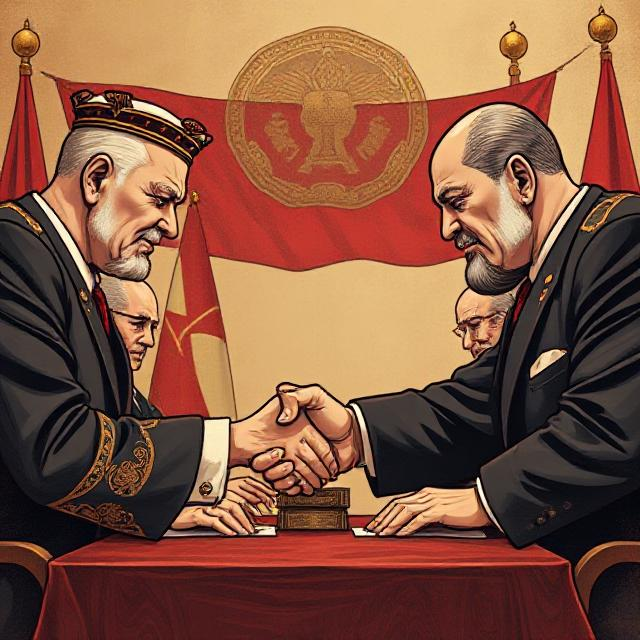
Diplomatic Deals Backed by Strength
Diplomatic agreements framed around displays of strength—such as military might, economic pressure, or political dominance—are often justified as practical tools to secure immediate outcomes.
Imagine a homeowner threatening to cut off a neighbor’s water supply during a dispute over property lines. While this might force a quick resolution, it poisons goodwill and invites future retaliation.
Similarly, states that lean heavily on coercion to shape deals risk achieving short-term compliance at the expense of long-term stability.
Power-based diplomacy treats negotiation as a zero-sum game, where “winning” means overpowering others rather than addressing root causes of conflict.
This approach overlooks the reality that unresolved grievances, like smoldering embers, can reignite unexpectedly.
Supporters argue that strength deters adversaries and prevents exploitation. A nation projecting power, they claim, is akin to a security guard in a bank: visible authority discourages bad behavior.
Historical examples, such as the use of sanctions to curb nuclear proliferation, are cited as successes. Yet this logic assumes weaker parties will passively accept demands, ignoring their capacity to resist covertly.
Consider an employee forced to accept unfair terms by a domineering employer; they may comply outwardly but undermine the agreement through subtle defiance. Coercion breeds resentment, incentivizing tactics like evasion, deception, or alliances with rival powers.
Over time, this erodes the legitimacy of the dominant party, much like a playground bully whose threats eventually unite others against them.
A deeper flaw lies in the conflation of fear with legitimacy. Agreements secured through intimidation resemble a contract signed under duress: legally enforceable but ethically dubious. Colonial-era treaties, where imperial powers extracted land and resources through force, exemplify this.
While such deals may appear binding, they lack moral authority, fostering cycles of resistance. Modern parallels include economic blockades or military threats to compel policy shifts. These tactics may yield temporary concessions but damage perceptions of fairness in global governance.
Imagine a sports referee who always favors the stronger team; over time, players lose faith in the rules altogether. Similarly, diplomacy rooted in dominance undermines trust in international institutions, weakening collective responses to crises like climate change or pandemics.
Alternative approaches emphasize reciprocity and shared benefit. Diplomacy built on mutual respect operates like a business partnership: both sides invest effort to ensure terms are sustainable. A baker trading bread with a farmer for wheat, rather than seizing the crop by force, fosters lasting collaboration.
This requires patience and empathy, acknowledging that even weaker states have agency and interests. Multilateral frameworks, such as climate agreements or trade pacts, illustrate how voluntary participation and balanced compromises can yield durable outcomes.
Strength need not be abandoned but should serve as a deterrent, not a default strategy. Think of a parent who uses authority to mediate sibling disputes fairly, rather than always siding with the louder child.
Overall, while diplomacy backed by strength can resolve conflicts swiftly, it often substitutes temporary control for genuine resolution. Sustainable agreements require balancing power with equity, ensuring all parties see value in upholding the terms.
A global order reliant on coercion is akin to a tower built on uneven stilts—it may stand briefly but crumbles under stress.
Investing in inclusive, principled diplomacy demands greater effort initially but builds a foundation resilient to shifting power dynamics. True strength lies not in forcing submission but in fostering cooperation that endures.
Through this angle we can percieve world politics with ease. Diplomatic agreements anchored in displays of strength—such as economic sanctions, military posturing, or resource monopolies—dominate current global politics, exemplified by tactics like Russia’s energy leverage in Europe or U.S.-China trade wars.
While such strategies may enforce short-term compliance, they mirror a landlord threatening to evict a tenant unless rent is doubled: immediate submission masks simmering resentment and future instability.
Power-centric diplomacy assumes weaker states lack agency, yet history shows coerced parties often retaliate through subterfuge (e.g., Iran circumventing sanctions) or align with rival powers, fracturing global cohesion.
This approach also conflates fear with legitimacy; a deal struck under threat, like a union signing a flawed contract due to layoff fears, lacks moral weight and fuels cycles of defiance. Current crises—such as vaccine nationalism during the pandemic or climate gridlock—reveal how dominance-driven deals hinder collective problem-solving.
Hence, true diplomatic resilience requires balancing strength with equity, akin to neighbors resolving disputes through shared rules rather than threats. Without this shift, the global order risks resembling a crumbling dam: temporary control, but catastrophic collapse under mounting pressure.